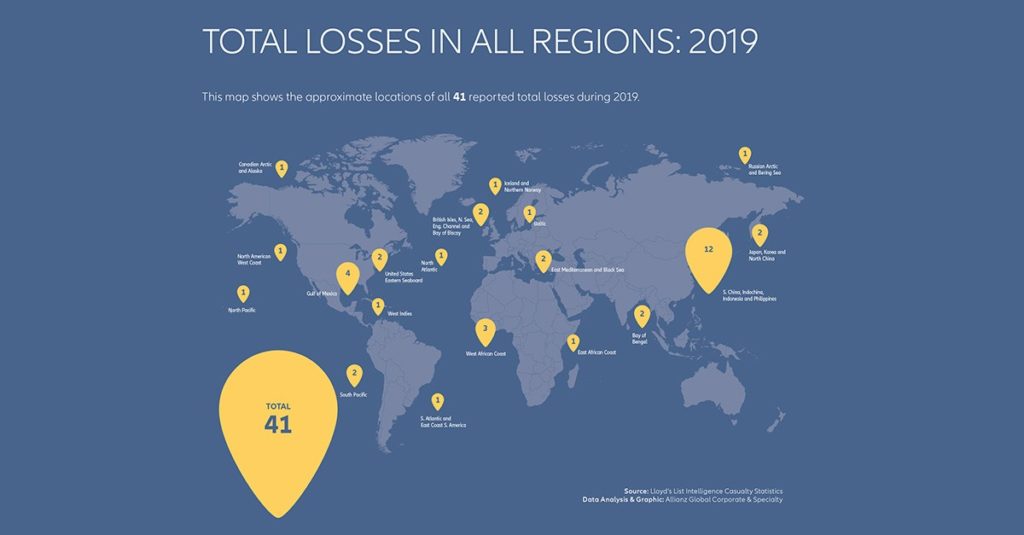- Safety & Shipping Review 2020: 41 large ships lost worldwide in 2019, down by more than 20% year-on-year and almost 70% over a decade.
- Number of shipping incidents (2,815) is up, as are claims from machinery issues. Ro-ro vessel safety is a growing concern.
- Consequences of coronavirus and a sustained economic downturn could threaten long-term safety improvement and trigger an uptick in losses from cost-cutting measures, fatigued crew, idle vessels and weakened emergency response.
- Rising geopolitical tensions, emissions rules and de-carbonization targets, mis-declared cargo and fire incidents continue to pose risk challenges.

Large shipping losses are at a record low having fallen by over 20% year-on-year, according to marine insurer Allianz Global Corporate & Specialty SE’s (AGCS) Safety & Shipping Review 2020. However, the coronavirus crisis could endanger the long-term safety improvements in the shipping industry for 2020 and beyond, as difficult operating conditions and a sharp economic downturn present a unique set of challenges.
“Coronavirus has struck at a difficult time for the maritime industry as it seeks to reduce its emissions, navigates issues such as climate change, political risks and piracy, and deals with ongoing problems such as fires on vessels,” says Baptiste Ossena, Global Product Leader Hull Insurance, AGCS. “Now the sector also faces the task of operating in a very different world, with the uncertain public health and economic implications of the pandemic.”
The annual AGCS study analyzes reported shipping losses over 100 gross tons (GT) and also identifies 10 challenges of the coronavirus crisis for the shipping industry which could impact safety and risk management. In 2019, 41 total losses of vessels were reported around the world, down from 53 12 months earlier. This represents an approximate 70% decline over 10 years and is a result of sustained efforts in the areas of regulation, training and technological advancement, among others. More than 950 shipping losses have been reported since the start of 2010.
Coronavirus challenges
The shipping industry has continued to operate through the pandemic, despite disruption at ports and to crew changes. While any reduction in sailings due to coronavirus restrictions could see loss activity fall in the interim, the report highlights 10 challenges that could heighten risks. Among these are:
- The inability to change crews is impacting the welfare of sailors, which could lead to an increase in human error on board vessels.
- Disruption of essential maintenance and servicing heightens the risk of machinery damage, which is already one of the major causes of insurance claims.
- Reduced or delayed statutory surveys and port inspections could lead to unsafe practices or defective equipment being undetected.
- Cargo damage and delay are likely as supply chains come under strain.
- The ability to respond quickly to an emergency could also be compromised with consequences for major incidents which are dependent on external support.
- The growing number of cruise ships and oil tankers in lay-up around the world pose significant financial exposures, due to the potential threat from extreme weather, piracy or political risks.
“Ship-owners also face additional cost pressures from a downturn in the economy and trade,” says Captain Rahul Khanna, Global Head of Marine Risk Consulting at AGCS. “We know from past downturns that crew and maintenance budgets are among the first areas that can be cut and this can impact the safe operations of vessels and machinery, potentially causing damage or breakdown, which in turn can lead to groundings or collisions. It is crucial that safety and maintenance standards are not impacted by any downturn.”
More: AGCS Marine Risk Consulting